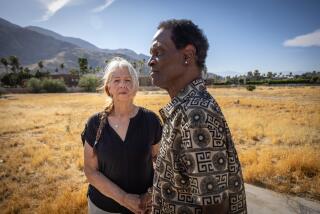Three Boys Brave a Town’s Anger, Outrage
- Share via
I cannot forget the face of 8-year-old Randy Ray standing alone in the schoolyard on the first day of classes last week. As other boys and girls recounted the highlights of their summers, Randy stood clutching the wire fence, his young eyes so puzzled, so clearly uncomprehending this brutal ostracism.
I spent that first week of school in Arcadia, Fla., home to the three Ray boys, hemophiliacs who tested positive for the AIDS virus in 1986. After revealing their condition, the boys were excluded from school, the family was asked not to return to church and Louise Ray lost her nursing job.
The boys--Ricky, 10, Robert, 9, and Randy, 8--are believed to have been infected with the virus from the clotting agent that they use to control bleeding.
Four weeks ago a federal judge ordered the school board to admit the boys, citing evidence that no case of AIDS had ever been transmitted in the schools and that no hemophiliacs were known to have transmitted the disease in the course of their daily lives.
Most residents refused to believe this evidence, choosing to rely on evangelical treatises to back up their views.
On my first Friday in Arcadia, the newly formed “Citizens Against AIDS in Schools” held a rally at the local rodeo arena. More than 800 residents of this small town near Sarasota converged in the 90-degree heat to vent their anger at the court order and to express their outrage to the Rays for “putting us through this traumatic experience and risking our children’s lives.”
With shades of Ku Klux Klan rallies that I had witnessed in the 1970s, Danny Tew, the president of the group, told the highly charged audience, “The courts are shoving this down our throats like they did with civil rights.” He then called for mandatory AIDS testing, the quarantining of all AIDS-infected children and a boycott of schools.
The day before school opened, a man called Cliff Ray, saying: “Your children will die.” The sheriff later explained that perhaps it wasn’t a death threat. “After all, we are all going to die.” The Rays chose to spend that night in hiding.
On the first day of school half the children stayed home to protest the Ray boys’ admittance. On Tuesday and Wednesday, anonymous callers phoned in bomb threats. All day long, all week, Cliff and Louise kept a vigilant check on those driving past and circling their house.
At school no one would play with Randy on Monday. His sister, Candy, overheard two other first-graders talking about the “AIDS boys.” In her squeaky voice she told them: “They do not have AIDS. They only have antibodies.” One of the boys told her to shut up, that she didn’t know anything. “Yes, I do,” she pursued, “they are my brothers.” They left Candy alone.
On Wednesday evening I sat talking with Ricky atop the boys’ tree house when some neighborhood kids came by looking for the “faggots” and “queers.” That same night Randy and Candy told me that they were afraid to go for a walk on the road “because the school board will come and run us over and say it’s an accident.”
By Friday the “Citizens Against AIDS” held another meeting “to keep interest high.” Shortly before the meeting, Louise says she received another threat. “They said they would burn the house down.”
Wasting no time, the Rays left their home, leaving the children’s uncle asleep in the back room. At about 10 p.m. a fire erupted in the boys’ bedroom. The uncle was rescued by a neighbor.
The Rays lost everything. Louise lost her wedding dress, and the children lost their favorite books. When Randy was told about the fire, he asked Cliff if his stuffed animal, “Mr. Monkey,” had been saved. Randy had carried “the stuffed animal around with him to the doctor, to the hospital, whenever he was frightened. “Mr. Monkey” burned, too.
No one in Arcadia has decried the week’s events. The “Citizens Against AIDS” deny any connection to the fire and to the other death threats. The mayor has not spoken publicly, but has withdrawn his 10-year-old from school. Even after the fire, only one church agreed to act as a clearinghouse for a Ray family relief fund. John Edmonson, the editor of the local paper, claims that “there simply is no moral leadership in this community.” Arcadia is an agricultural town, and most people I met seemed like decent people who said that “extremists” were few. Yet Louise recalls other times where appearances belied reality. “Most Americans were good people when they interned the Japanese. Most Germans were good people when Hitler rose to power. I’m not Japanese or Jewish. My family has lived here for three generations. Why aren’t people speaking out?”
To the outside world these kids are brave beyond belief. Yet, inside, their pain is immense and so palpable. Since leaving Arcadia, I am haunted by the memory of Robert’s bright eyes the night before the first day of school. He looked up at me. He didn’t say a word. His eyes simply begged me to say it would be OK. I held his hand and said the only thing that came to mind: “Be brave.” He was, and still is--unlike so many of the adults in Arcadia, Fla.
DR, EWK, Aftonbladet, Stockholm
More to Read
Sign up for Essential California
The most important California stories and recommendations in your inbox every morning.
You may occasionally receive promotional content from the Los Angeles Times.













